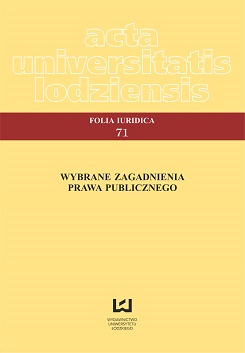Conditional cumulative sentence after introduction of the amendment in 2009
DOI:
https://doi.org/10.18778/0208-6069.71.05Abstract
The subject of this paper is an issue of the conditional cumulative sentence under art. 89 of the penal code (p.c.) particularly focusing on amendments to this provision introduced by the statute of 5 November 2009 which came into force on 8 June 2010. In the paper an effort has been made to show that amendments to art. 89 (p.c) had not removed a lot of unclear issues and interpretation ambiguities and in some cases they had created new problems. As long as it clearly results from provisions of art. 89 (p.c.) that in a cumulative sentence it is possible to join sentences of the same kind of which at least one is passed but is conditionally suspended and deprivation of liberty sentences, it is still not clear if it is possible to join sentences of restricting liberty or fines, conditionally suspended. The same doubt concerns sentences of various types both when they are compiled as “absolute sentences and conditionally suspended” and when they all have been passed as conditionally suspended. It is true that it has been accepted that only one-type sentences or liberty deprivation sentences together with sentences of restricting liberty of which at least one is conditionally suspended are subject to the cumulating of the sentences whose service may be conditionally suspended ( arg. ex art. 87 p.c.). But it is still ambiguous and not clear. It has not either been decided unambiguously if in case of enforcement means of reaction to a crime in combinations mentioned directly in § 1 and 1a art. 89 p.c. as well as in those admitted when applying a maiori ad minus reasoning their cumulating is a duty of the court or its right which it can exercise e.g. when conditions to suspend a sentence are satisfied (specified in art. 69) and the passing of a cumulative sentence will not aggravate a convict’s situation. Though the legislator has resolved that in case of liberty deprivation sentence conditionally suspended the court may pass an absolute sentence it is still not certain if the conditional cumulative sentence is only a possibility (or perhaps a duty of the court) when there is a different combination of enforcement means. There is also an issue of a conditional cumulative sentence when all individual sentences are absolute. A question arises if a possibility of applying this institution may be admitted under art. 89 p.c. and if not, then perhaps under general provisions. In the paper it has been decided that neither the first nor the second solution is correct. The issue of the conditional sentence has still not been decided in a situation of ruling at the same time as of all crimes that are in real concurrence. In this issue the “November amendment” which restricted the provision under art.89 p.c. to the cumulative sentence only caused a return to times when the previous codes had been in force and which had not absolutely referred to the issues in question and opposing solutions had been being accepted (both in literature and in judicature) – (i.e. applying the institution of the conditional sentence either at the stage of passing individual sentences or at the stage of passing the cumulative sentence) of which every one now poses quite serious practical problems.
Downloads
Downloads
Published
How to Cite
Issue
Section
License

This work is licensed under a Creative Commons Attribution-NonCommercial-NoDerivatives 4.0 International License.














